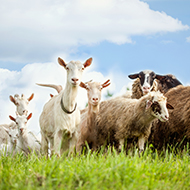
Event will showcase solutions for grazing, health and flock management.
Scotland’s Rural College (SRUC) will be running an online workshop on Thursday (10 February) focusing on new technologies for sheep and goat farmers.
The Technology and Digital Solutions for Sheep Farming event will highlight advanced technologies tailored to sheep farmers’ needs for grazing, feeding, health, reproduction and flock management.
It is taking place as part of the Sm@RT (Small Ruminant Technologies) project, funded by the EU Horizon 2020 research programme, bringing together researchers from across the globe to improve awareness of newly available digital tools.
Similar workshops held in September and October last year gathered farmers’ needs for tools and methods that could facilitate their farm working conditions. These needs were then discussed at an international conference on 12 October, attended by more than 100 farmers, advisers and researchers.
During the conference, each country and production type was asked to propose solutions to farmers’ needs in two other countries.
For the UK, the main needs and solutions identified centred on fencing, measuring grassland, early identification of unhealthy animals, identifying animals at a distance or automatically, and drafting lambs ready for slaughter.
“This bottom-up approach was well received by participants, and it was pleasing to see many innovative and PLF solutions being proposed by farmers for farmers,” commented SRUC’s Dr Claire Morgan-Davies, project coordinator for Sm@RT.
“The next step in the project will be to formalise the solutions to the identified needs and propose guidelines and farmers’ testimonies on how to implement them on farms.”



 The Federation of Independent Veterinary Practices (FIVP) has announced a third season of its podcast, Practice Matters.
The Federation of Independent Veterinary Practices (FIVP) has announced a third season of its podcast, Practice Matters.